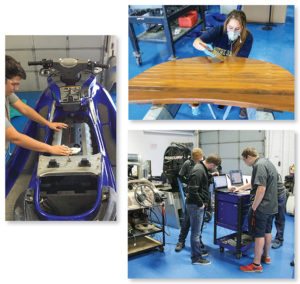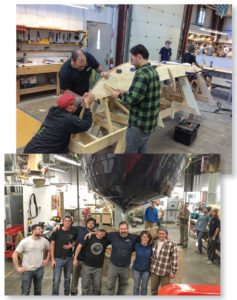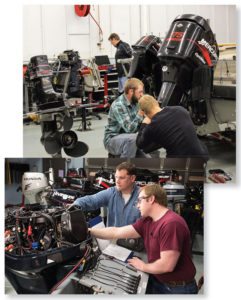The Workforce Crisis: Marine schools offer base education

Marine trades schools offer students the opportunity to learn specifically about the boating industry and its intricacies at the high school and post-secondary level. While these students may require additional training beyond their education, the base provided by these schools is invaluable.
The Landing School is a community college in Arundel, Maine, that offers four one-year diploma programs in wooden boatbuilding, composite boatbuilding, yacht design and marine systems technology. Students can also choose to earn an associate’s degree in marine industry technology, which requires taking any of the two programs offered by the school at 15 semester credits in general education.
“Our students go to school Monday through Friday from 7:30 in the morning until 4:30 in the afternoon, with an hour for lunch,” said Barry Acker, director of development/industry relations at The Landing School. “It’s absolutely a full-time job for them, and they’re not only learning the hands-on piece of building boats – they’re learning the theoretical piece of it as well.”

The Landing School facilitates students’ entry into the workforce by helping them create a career profile identifying what the student wants to do, where they want to go geographically, what companies interest them and more. Students have access to an employer resource guide, which contains roughly 500 marine companies the school has had some kind of connection with over the year; that list is updated monthly.
Similarly, Wisconsin Indianhead Technical College offers a three-semester marine repair program to educate students on repairing a variety of engines. As members of the American Boat & Yacht Council, the school teaches to ABYC standards.
The school hosts career days for local high school students to tour the programs, as well as a shadow program where prospective students can spend a day at a specific program and work with current students to get a feel for what the training will look like and the possible workplace after graduation.
“We found that we really need to connect with high schools and the high school counselors themselves,” said Todd Larson, marine repair instructor at WITC. “It is a very high-demand field and students or prospective students are starting to see that and they’re enrolling specifically because it’s easy to get a job and if they are technically proficient when they leave, they will be successful.”
Larson believes marine trades programs like WITC ensure the student is well grounded in engine basics and how to troubleshoot properly. For this reason, he recommends dealers who are interested in home growing their techs consider a tuition reimbursement program and sending those employees to a marine trades school.

“We have many instances where dealerships have found a yard person that has interest in the marine field and has sent them to us for a year and a half, and then employed that person part time,” said Larson. “To ensure the success of that home-grown tech, sending them to a technical college is a great way to actually speed up and make the technician more efficient and more profitable in a shorter period of time.”
The Impact Institute in Indiana is a technical high school with two-year vocational programming in 14 different careers, including marine mechanics. Upon graduation, students are prepared to either attend Marine Mechanics Institute in Orlando for post-secondary education or be streamlined into a dealership where the employer can provide additional training. The school offers paid internship programs for students, where they can go twice a week to a marina during the normal class period to get hands-on training experience.
The school offers certifications through partners like Evinrude and Mercury in essentials and e-skills training.
“Those will take you through electrical systems and cooling systems, and then once they complete those [certifications], those go with the student to the dealership,” said Ryan Ramsey, instructor at Impact Institute.
That support of industry partners is what makes it possible for schools like Impact Institute to grow. Donations from manufacturers make the dollars and cents of marine schools add up in a way that keeps programs open.
In addition to support from those partners, Impact Institute has an advisory committee that helps guide its program. Involvement from employers provides schools an accurate picture of what a career in the marine industry looks like today.

“When we make decisions about what we’re going to do with this program and what is next, we lean pretty heavily on that advisory committee to help give us guidance, “ said Jim Walmsley, director at Impact Institute. “They don’t make decisions for us per se, but they are the ones that are in the field and they know what’s current and they know what’s going on.”
Larson added that time, resources and personnel are lacking on the post-secondary level as well when it comes to promoting its programs beyond regional outreach. He would like to see the industry take up responsibility to promoting those careers nationally.
“All of the schools are very regional and they can’t reach all over the country to find students, so I think it’s important to convince the marine industry,” he said, “that they need to go out and find technicians or potential technicians at high schools [and] tech ed programs at high schools, court those technicians and get them enrolled at their local technical college or marine school, and then offer them a job after the fact.”
Walmsley added the industry should promote its career options and post-secondary institutions to students who are preparing for graduation, in the same way colleges market to students. While students who have academic records that are attractive to universities get letters and flyers from those institutions, those students are rarely introduced to similar marketing from technical careers.
MRAA offers a list of current marine trades schools and the association offers technical scholarships to marine trades students to continue training at the Marine Dealer Conference & Expo. That list can be found at www.mraaindustrydirectory.com/Category/8677/1/Marine-Certificates-Degrees.
For ideas on how to train new employees, see page 34.




